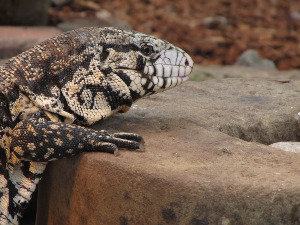Dog-Sized Lizards Invade a Delicate Ecosystem
by Ayden Ross, age 14

A dog-sized lizard, the Argentine black-and-white tegu, is rapidly taking over the Everglades National Park. This lizard, native to South America, is spreading throughout South Florida and the southeastern region of the U.S. Biologists are concerned because these lizards will eat almost anything that will fit into their mouths, from berries to small animals such as birds and reptiles, as well as the eggs of animals that nest on the ground such as endangered sea turtles.
These dog-sized lizards can make very calm pets for those who like exotic reptiles. Unfortunately, people have let them loose into the wild where they have bred prolifically. Official estimates of the tegu lizard population in the U.S is unknown, however, a 2018 study conducted by the U.S. Geological Survey stated that, “the entire southeast portion of the United States is at risk.”
Once in the wild, the tegu lizards are able to thrive in regions containing grasslands and in other areas that have a significant amount of rain, such as in hardwood and subtropical pine forests.
The tegu lizards’ predatory eating habits are what cause the most concern for biologists. In Venezuela they are known as the
lobo pollero
, the “chicken wolf,” because they sneak into chicken coops and eat the chickens’ eggs. If they continue to spread too far into the Southeast, many animals living on the ground could be at risk, including many listed on the Endangered Species Act, like the Eastern Indigo snake.
The tegu lizards are extremely hardy. They are able to hold out against colder temperatures compared to other species of lizards; in fact, they can elevate their body temperature by 18 degrees Fahrenheit. If it gets too cold in the winter, the tegu will brumate, a version of hibernation for reptiles. The tegus are known to take refuge in burrows they have stolen from gopher, tortoises and other burrowing animals.
In Georgia, biologists have been trying to trap the tegus in Toombs and Tattnall counties, west of Savannah. Part of the solution to stopping the tegu in Georgia has been to encourage state residents with awareness campaigns, encouraging them to report tegu sightings. Once a tegu is identified, the Georgia Reptile Society captures the lizard, takes it to a rescue facility and gives the lizard away to anyone who might want it as a pet.
The volunteers hope to reduce the number of tegu lizards in the wild. It is important that pet owners learn how to properly take care of these lizards and prevent their escape into the wild where they can threaten other animals. Ultimately, careful management of the tegu lizard population will allow for the survival of many important species in ecosystems across the U.S.
[Source:
National Geographic
]

